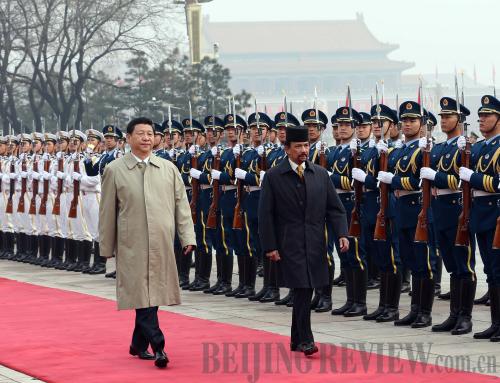|
 |
|
STRUTTING SULTAN: Visiting Bruneian Sultan Hassanal Bolkiah reviews an honor guard along with Chinese President Xi Jinping in Beijing on April 5 (LIU WEIBING) |

Brunei's Sultan Hassanal Bolkiah paid a state visit to China in early April as the first foreign head of state Chinese President Xi Jinping has welcomed since taking office in the previous month. During the visit, the two countries agreed to upgrade their ties to a "strategic cooperative relationship."
Brunei, which took over the rotating presidency of ASEAN from Cambodia at the beginning of this year, is confronted with a host of challenges. These include unprecedented political shifts in East Asia triggered by the U.S. pivot to the Asia Pacific and a much tougher situation for the establishment of an ASEAN Economic Community within the remaining two years.
Observers are watching closely how Brunei will help bridge differences within ASEAN, speed up the completion of the ASEAN Economic Community as well as the regional cooperation of East Asia, and maintain peace and stability in the South China Sea.
Coordination counts
ASEAN holds the driver's seat in East Asian cooperation. Bruneian leaders have frequently visited ASEAN's dialogue partners, especially China and the United States, to prepare for a series of East Asia summits in October amid increasing competition in the region between big countries. In February, Brunei's Minister of Foreign Affairs and Trade Mohamed Bolkiah visited Beijing and exchanged views on bilateral relations and the summits. During Hassanal's state visit, the top leaders of the two countries exchanged views on promoting China-ASEAN cooperation as well as the proper handling of the South China Sea issue.
China maintains that South China Sea disputes shall be peacefully resolved through bilateral consultation and friendly negotiation between directly concerned parties. Pending the final settlement of the disputes, China wishes to strengthen dialogue and communication with ASEAN nations to jointly safeguard peace and stability in the South China Sea. China objects to any factors that interfere with the process of friendly cooperation. Brunei called for making concerted efforts with all parties concerned to implement the Declaration on the Conduct of Parties in the South China Sea signed in 2002 and earnestly safeguard peace and stability in the region. The Bruneian sultan also claimed that the South China Sea issue should not become a barrier for the China-ASEAN friendship.
Before visiting China, Sultan Hassanal made a trip to Washington in March, during which he exchanged ideas with U.S. leaders on issues concerning the preparation of the October East Asia Summit and the U.S.-ASEAN Summit. Through the high-level visits, Brunei strengthened relations with the two major countries. At the same time, they helped boost the role of Brunei as the ASEAN chair and lay the groundwork for its future efforts to coordinate with big countries.
South China Sea priority
Due to the Philippines and Viet Nam insisting on including South China Sea disputes in the joint communiqué, the ASEAN Foreign Ministers' Meeting held last July for the first time in its history concluded without such a document, discouraging the ambitions of the two countries. However, backed by the United States and Japan, the Philippines and Viet Nam would not put the matter to rest. In January this year, the Philippines brought South China Sea disputes with China to a UN tribunal in an attempt to seek binding arbitration. Viet Nam is also eager to follow suit.
The United States, though claiming not to take sides in South China Sea disputes, sent aircraft carriers to the region last year in the name of protecting the freedom of navigation. But China holds that there is no navigation freedom problem in the region. At a press conference after meeting with Hassanal in March, U.S. President Barack Obama told reporters he will raise maritime territorial issues at the October East Asia Summit and the U.S.-ASEAN Summit.
With a series of diplomatic moves, Japan also attempts to take advantage of island disputes between China and some of ASEAN nations to contain China. During his visit to Brunei in January, Japanese Foreign Minister Fumio Kishida said both Japan and Brunei have territorial disputes with China and dealing with China is a common issue of both countries, statements that carry dubious motives. On March 14, the Japanese Government hosted a vice-ministerial level defense dialogue with ASEAN nations to discuss defense and security issues in the Asia Pacific in the hope of intimidating ASEAN nations to join the anti-China camp.
| 